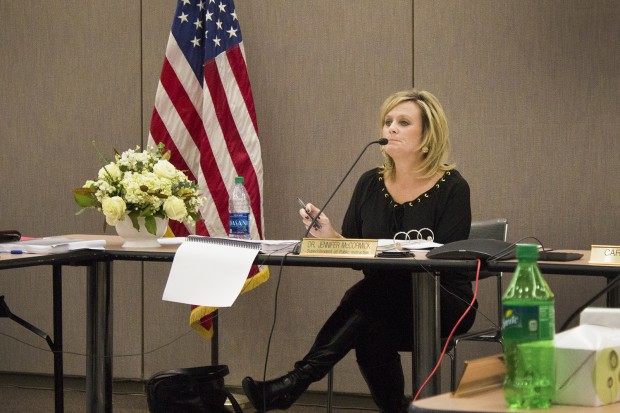Indiana Schools Would Lose $56 Million Under Trump Education Budget

Jennifer McCormick, Indiana superintendent of public instruction, says Indiana schools would be affected by the proposed federal education budget. (Peter Balonon-Rosen/Indiana Public Broadcasting)
Indiana schools stand to lose about $56 million for teacher training and after school programs for low-income students, under proposed budget cuts by President Donald Trump’s administration.
Jennifer McCormick, Indiana superintendent of public instruction, says the proposed budget would be “a big hit” to the state. She says cuts would hamper efforts to attract teachers, stifle new programs under a new federal education law and reduce programs for low-income students.
“Is it concerning? Absolutely,” McCormick says. “We need as much money to flow into our traditional public schools, and our public charter schools that are struggling, [as] we can get there.”
Trump’s proposed budget would slash the U.S. Department of Education’s budget by $9 billion, a 13.5 percent reduction.
It would eliminate funding for two major programs. The first is the Supporting Effective Instruction State Grants program, or Title II funds, which provides money for teacher training retainment. The second is the 21st Century Community Learning Centers program, which funds after school programs for low-income students.
The Indiana Department of Education is set to receive $55.9 million for the two programs during the 2017-18 school year.
In December, the department awarded nearly $10.3 million to 57 organizations to provide after school programs for students in low-performing and high-poverty schools under the 21st Century Community Learning Centers program. Those organizations provide services from academic tutoring to music, arts, sports and cultural activities.
“Some of those after school programs are a vital part of what we’re doing,” McCormick says. “Just to eliminate it, I don’t think, is the best course of action.”
McCormick says she is also concerned about the move to eliminate funds for teacher training and retainment.
“That would be devastating,” McCormick says. “Many districts use that money now for class size reduction, for professional development, for teacher leadership development.”
She says cuts at the federal level would be exacerbated by “modest” state funding for schools.
“We’re looking at, potentially, a very small increase from the state level budget,” McCormick says. “So that, on top of maybe a significant hit from the federal budget, obviously, is kind of a double edged sword.”
One of the largest unknowns in the Trump administration’s proposed budget is a $1 billion increase for Title I, which provides funding to high-poverty schools. This increase would be dedicated to promoting and increasing school choice for students.
How that would play out for Indiana, the state with the nation’s most robust school choice program, remains “up in the air,” McCormick says. She wants more details.
“Is that to start choice? Is that the sustaining of choice? Is it to provide more choice? – We’re pretty saturated already,” McCormick says. “There are just a lot questions still.”